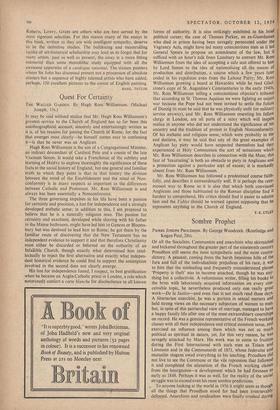Quest For Certainty
I T may be said without malice that Mr. Hugh Ross Williamson's greatest service to the Church of England has so far been this autobiographical account, sincerely and entertainingly written as it is, of his reasons for joining the Church of Rome; for the fact that emerges most clearly—he himself comes near to confessing it—is that he never was an Anglican.
Hugh Ross Williamson is the son of a Congregational Minister, an indirect descendant of Cardinal Pole and a cousin of the late Viscount Simon. It would take a Frenchman of the subtlety and learning of Halevy to explore thoroughly the significance of these facts in the social history of England, but one general and familiar truth to which they point is that in that history the division between the mind of the Establishment and the mind of Non- Conforrnity is in many respects as important as the differences between Catholic and Protestant. Mr. Ross Williamson is and always has been essentially a Nonconformist.
The three governing impulses in his life have been a passion for certainty and precision, a lust for independence and a strongly developed aesthetic sense; in addition to this, I am prepared to believe that he is a naturally religious man. The passion for certainty and exactness, developed while shaving with his father in the Manse bathroom, might have led hirn to Geneva or Blooms- bury but was destined to lead him to Rome; he got there by the familiar route of discovering that the New Testament has no independent evidence to support it and that therefore Christianity must either be discarded or believed on the authority of an Infallible Church, though exactly what determined him intel- lectually to reject the first alternative and exactly what indepen- dent historical evidence he could find to support the assumption involved in the second does not clearly emerge.
His lust for independence found, I suspect, its best gratification when he became an Anglo-Catholic priest in London, a role which notoriously confers a carte blanche for disobedience to all known forms of authority. It is also strikingly exhibited in his brief political career; the case of Thomas Parker, an ex-Guardsman who died in prison having been savagely persecuted under the Vagrancy Acts, might have led many conscientious men as it led General Spears to propose an amendment of the law, but it sufficed with an hour's talk from Lansbury to convert Mr. Ross Williamson from the idea of accepting a safe seat offered to him by Lord Simon to the idea of nationalising all the means of production and distribution, a course which a few years later ended in his expulsion even from the Labour Party; Mr. Ross Williamson growing a beard at Hawarden while he read Glad• stone's copy of St. Augustine's Commentaries in the early 1940s, Mr. Ross Williamson telling a conscientious objector's tribunal that according to St. Thomas Aquinas we were fighting an unjust war because the Pope had not been invited to settle the future of Danzig (it must be said that he was physically unfit for military service anyway), and Mr. Ross Williamson resenting his fellow clergy in London, are all parts of a story which will inspire malice in anyone who did not understand the significance of his ancestry and the tradition of protest in English Nonconformity- Of his esthetic and religious sense, which were probably in the end decisive, it may be said that any of the great examples of Anglican lay piety would have suspected themselves had they experienced at Holy Communion the sort of sensations which Mr. Ross Williamson describes in connection with the Mass; this fear of 'luxuriating' is both an obstacle to piety in Anglicans and a protection against a particular sort of excess; it is markedlY absent from Mr. Ross Williamson.
Mr. Ross Williamson has followed a predestined course faith- fully, and describes it extraordinarily well. It is perhaps the corn• monest way to Rome as it is also that which both convinced Anglicans and those habituated to the Roman discipline find it hardest to comprehend. His critics should find it easier to admire him and the Tablet should be warned against supposing that he represents anything in the Church of England.
T. E. UTLEY










































 Previous page
Previous page